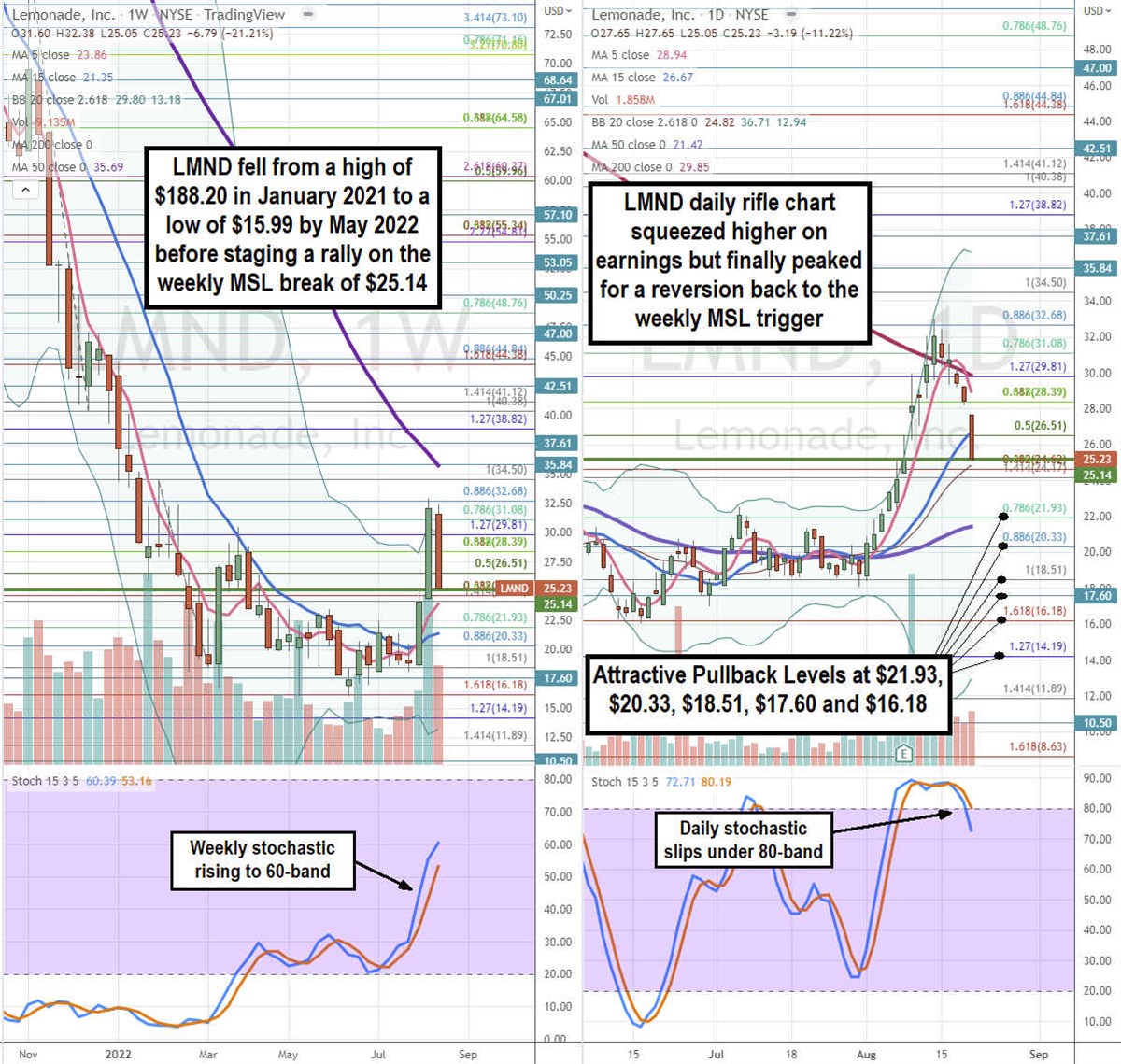
Insurance fintech platform provider Lemonade (NYSE: LMND) stock has surged off its $15.99 lows in May to double after its earnings release in August 2022. The insurtech disruptor is trying to break the conventional mold in the five trillion dollar insurance industry. It’s artificial intelligence (AI) powered platform simplifies the sign-up and onboarding process and quickly approves claims and payouts to the satisfaction of its customers. Lemonade looks to benefit from the process bottlenecks that consumers experience using traditional insurers. They offer savings of up to 80% on policies versus traditional carriers as well as streamlined claims processing and a gave back to charities feature culminating in a frictionless experience. All this and more can be done easily and conveniently on the app without having to file a ton of paperwork through a broker. All the cost savings help keep its policies costs down. Does this sound too good to be true? The market certainly thought so after the hype subsided, and its stock price cratered by over (-80%) from its highs in under two years into the recession. While millennials may believe in the products, the Gen-X and older demographic have been a tougher crowd since the company is relatively new being founded in 2015. Nearly 87% of their customers are first-time insurance buyers. Will Lemonade reach the tipping point before time and cash runs out?
AI vs. Humans
The insurance industry is run by decades to centuries old players like Allstate (NYSE: ALL), Cigna (NYSE: CI), Progressive (PGR) and Berkshire Hathaway (NYSE: BRK.A). Insurers profit from the friction that customers weather. Claims that are delayed or denied due to process bottlenecks equates to more bottom line for insurers as they collect more interest on the money that is held longer in its coffers. Traditionally highly paid human actuaries apply the science in constructing, underwriting, and issuing policies. Lemonade utilizes AI-powered actuaries to design policies in mere seconds utilizing its data and predictive analytics. As it issues more policies and collects more data, it should measurably improve the quality of the policies in time. It’s expected that the loss ratios start large and get smaller through optimization and refinement in time. Lemonade is showing the sequential improvement in loss ratios dropping from 97% to 86% in the last three quarters. Users can get a quote in minutes utilizing its simple AI chatbots Maya and Jim through its website or mobile app. Lemonade currently provides home, rental, life, pet insurance, and car insurance in most U.S. states.
Growth is Back
On Aug. 8, 2021, Lemonade released its second-quarter fiscal 2022 results for the quarter ending June 2022. The Company reported earnings-per-share (EPS) loss of (-$1.10) beating consensus analyst estimates for a loss of (-$1.31) by $0.21. Revenues grew 77.3% year-over-year (YoY) to $50 million, beating consensus analyst estimates for $47.56 million. Customer count rose 31% to 1.58 million. Premiums per customer rose 18% to $290. Gross loss ratio of 86% was a sequential improvement from 90% in Q1 2022 and 96% in Q4 2021.
Is Q3 the Tipping Point?
For Q3 2022, Lemonade expects revenues to come in between $63 million to $65 million versus $56.98 million consensus analyst estimates. Losses are expected to peak in Q3 2022 and start to shrink thereafter “charting a clear path to profitability”. For full year 2022, Lemonade expects to hit revenues of $236 million to $239 million versus $214.67 million analyst estimates. EBITDA loss was improved to come in between (-$245 million) to (-$240 million) from the earlier (-$280 million) to (-265 million) range. In force premiums (IFP) guidance was raised to $610 million to $615 million, up from $535 million to $545 million. Lemonade CEO Daniel Schreiber commented, “Overall, we feel that our business is beginning to hit its stride with improving loss ratios, increasing cross-sells and upsells and the seasoning book. All three lead us to believe we will see peak losses this quarter with losses declining in Q4 and even as we continue to grow an expectation of shrinking loss year-on-year thereafter as we progress on our path to profitability.”

Here’s What the Chart Says
Using the rifle charts on the weekly and daily time frames provides a near-term precision view of the price action playing field for LMND shares. The weekly rifle chart reversed course after the downtrend bottomed out near the $16.18 Fibonacci (fib) level. The weekly breakout and uptrend has a rising 5-period moving average (MA) support at $23.86 followed by the 15-period MA at $21.35. Shares overshot the weekly upper Bollinger Bands (BBs) at $29.80 before falling back down to the weekly market structure low (MSL) buy trigger at $25.14. The weekly 50-period MA resistance is falling at $35.69. The weekly stochastic formed a mini pup oscillation to the 60-band. The daily rifle chart uptrend peaked just above the $32.68 fib before collapsing on the stochastic mini inverse pup fall through the 80-band. The daily 200-period MA at 29.85 couldn’t hold support and the daily 5-period MA is sloping down at $28.94. The daily 15-period MA support couldn’t stop the selling at $26.67. The daily lower BBs are rising at $12.94. Prudent investors can wait out the daily stochastic oscillation down before considering attractive pullback levels to consider scaling into a position at the $21.93 fib, $20.33 fib, $18.51 fib, $17.60, and the $16.18 fib level.